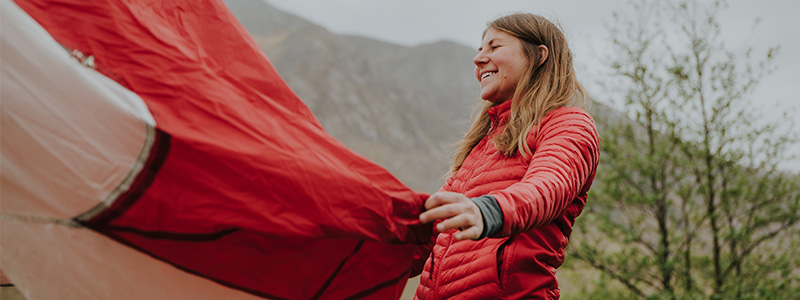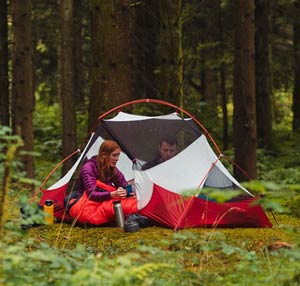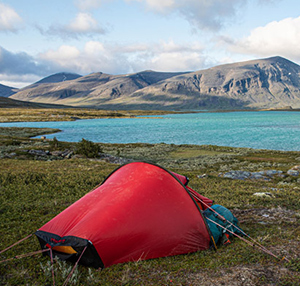Camping For Beginners
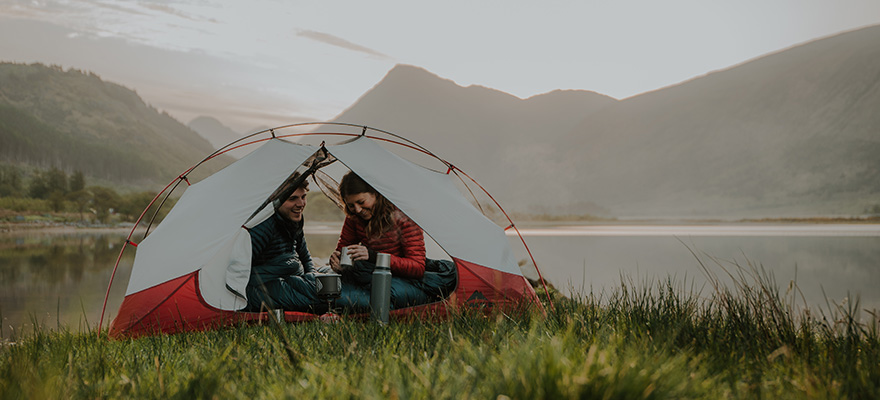
Camping is an amazing way to spend time with friends and family enjoying nature and the outdoors.
Whether it’s been a few years since you last went camping or you’ve never been before we’ve got all the camping for beginners info you need.
How To Plan A Camping Trip
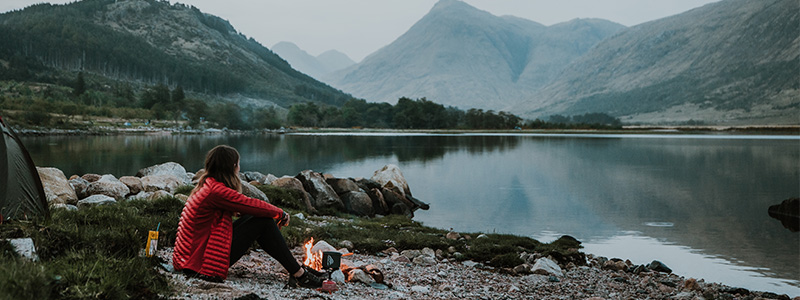
Camping Location
There are many campsites all over the UK with varying levels of facilities, camping spaces and activities to suit all needs. It’s worth considering what attractions are nearby, what cleaning, cooking and on on-site entertainment facilities you want and if the campsite rules e.g family-friendly or dogs allowed fit your needs.
Here are some websites for finding that perfect campsite:
Practice Setting Up Camp
It is worthwhile practising putting up your tent at home to test that it is functional. This will also help you feel accustomed with the steps involved in putting it together.
Modern tents are made from very durable fabrics that will stay waterproof for a number of years. If you have an old tent or a second-hand one, pour some water on top of it to see if it is still waterproof, the water should bead and run off.
Problems occur when rain sticks to the tent fabric and wets out the area. This could lead to water entering the tent. If this happens we have a guide on how to re-proof your tent along with how to clean a tent and how to repair tent fabric.
Duration Of Camping Trip
If it is your first time camping, the prospect of living outdoors away from the convenience of home comforts can be intimidating. One of the best ways to introduce yourself or your kids to camping is to go for a weekend to a local campsite. Most campsites let you book the length of your stay in one or two-day blocks.
This way you can test out your camping set-up in real life. Next time you go you’ll be ready for a full week of camping.
Different Types of Camping
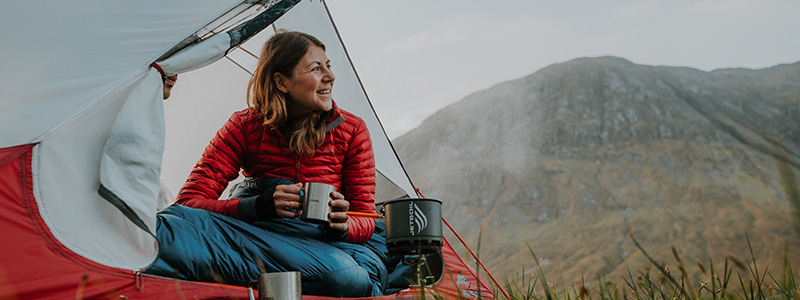
FAMILY CAMPING
When camping with kids, most families enjoy staying at an official campsite in a multi-person tent with a porch or covered seating area. The site should provide you with the facilities to cook, clean and shower as well as play areas and other entertainment for your children. Extra space in the tent makes it easier to relax and play games together should you need to take shelter from the rain.
GLAMPING
‘Glamorous camping’ removes some of the more mundane aspects of camping often with a tent or yurt already pitched for you. With features like more substantial bedding options, a kitchen area, log burner, pizza oven and several other home comforts.
Festival Camping
Camping at a festival is all about convenience and easy to erect tents are a common site. Making sure you have a good camp chair is also essential for surviving a weekend of music and late nights.
WILD CAMPING
Wild camping is any time that you camp outside of a designated campsite; usually in a remote area that you have walked to. Because of the walking involved wild camping equipment tends to be lightweight and specific to this style of camping. You are allowed to do this under certain guidelines (the Land Reform Act) in most of Scotland and some small areas within England and Wales.
BIVVYING
Used for fast and light adventures, a bivvy encases your body with a waterproof and windproof sleeping bag style cocoon. People enjoy this style camping for its simplicity, lightweight approach, speed of setup and closeness to nature.
Essential Camping Equipment
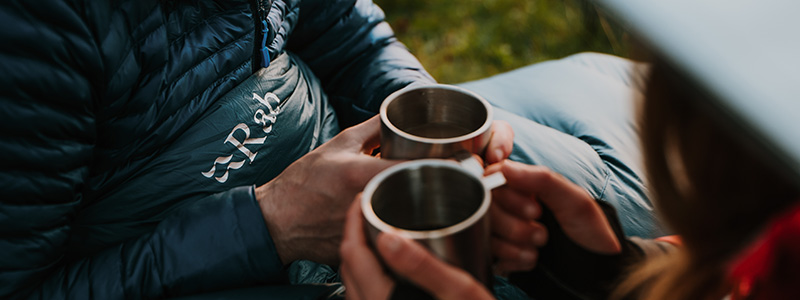
There are some key pieces of equipment that you will need to take on any trip - making a checklist is one way to make sure you don’t forget anything vital.
Essential Campsite Equipment Checklist
- Tent
- Sleeping bag
- Camping Mat
- Camping Pillow
- Stove
- Water Bottle or Flask
- Food
- Cookware and Eating Utensils
- Washing-up Bowl, Sponge and Washing Up Liquid
- Camping Furniture
- Head Torch or Lantern
- Mallet
- Insect repellent
- Repair Kit
- First Aid Kit
- Multi-tool
- Games and Activities
If you want a helping hand in working out what equipment best suits your needs, we have dedicated guides that feature in-depth information around each piece.
- How to choose a tent
- How to choose a sleeping bag
- How to choose a camping mat
- How to choose a camping stove
How To Set Up Your Camp
CHOOSING A PITCH
Some campsites will provide you with a specific pitch whereas some will leave you to your own devices. Sites with better facilities tend to be more regimented in their approach to where you camp.
If you can choose your pitch it’s worth considering:
-
Lay of the land: a flat space with a gentle slope is best for sleeping (with your head uphill) and ensuring water will run away from your tent.
-
Sunrise and sunset: position your tent opening to ensure you wake up with the sun or change the direction to catch a sunset.
-
Wind: if you are by the coast or in an exposed campsite the wind could make it unpleasant and difficult to cook. Position your tent near a hedge or where possible use your car or other tents from your group as a windbreak.
-
Proximity to other campers: try to position your tent a reasonable distance (6m) away from others to give yourself and them some privacy and personal space.
-
Cooking and relaxing space: make sure to leave yourself some room to cook in, a safe distance from your tent and it’s always nice to be able to create a seating area for relaxing in.
-
How far you're from the facilities: this is worth considering if you have lots to carry or if you need to make regular use of the facilities.
HOW TO PITCH YOUR TENT
Hopefully, you’ve been able to practice setting up your tent at home and are now accustomed to how it all pieces together. Here are a few more tips that should help you with this somewhat task.
-
It's a good idea to try and plan your journey to your campsite so that you can erect your tent in daylight.
-
Having a mallet to hit your tent pegs into the ground is a lot easier than using your feet to push them in and it helps to prevent the pegs from bending, especially on dry ground.
-
Remember to clear the ground of sticks and other bits before setting up your tent.
-
Use all the guylines that come with the tent so that if the wind does pick up it will remain strong and stable.
How To Cook When Camping
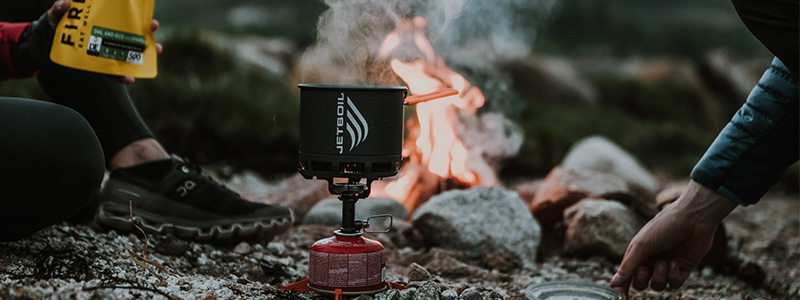
You can keep the cooking as simple or as complicated as you want when it comes to camping. Depending on the weather a cool box with ice can keep food safe to eat for days.
It’s always good to take something you've already cooked or a (dehydrated meal) to quickly heat for your first meal. If the weather turns, cooking outside won’t be pleasant so some food that you can eat without cooking or a trip to a local restaurant is a good option. It’s important to remember that you should never cook inside your tent as it is dangerous. Campsite rules and regulations will dictate what methods of cooking you can use.
-
Stove: A gas stove is a quick and easy way of cooking which is only limited by the amount of gas you’ve packed. Pack more than you think you’ll need as it’s more than annoying if you run out.
-
BBQ or Fire Pit: If your campsite allows these, make sure to give yourself plenty of time for the fire to heat the coals or wood so that you can safely cook your food. On-site facilities: some campsites have communal cooking facilities such as pizza ovens and this can be a nice alternative to stove cooking.
Activities For Camping
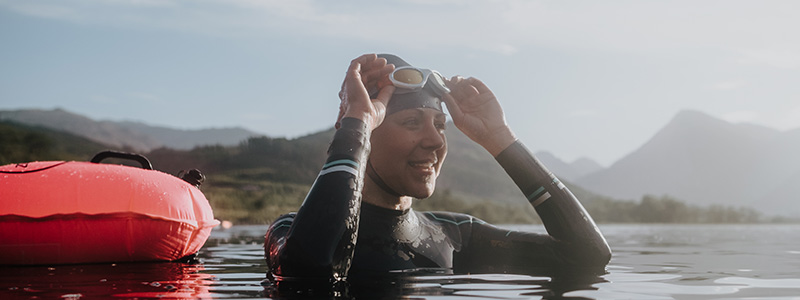
Camping puts you in the middle of the countryside or at the coast where you have doorstep access to amazing terrain. There is normally a plethora of outdoor activities.
HIKING
Going on a hike is one of the simplest and most satisfying activities when camping. You’ll often have several circular routes starting from your campsite.
DAY TRIPS
Give yourself a new adventure every day and use your campsite as a base to explore local castles, nature reserves, lakes and all the other attractions the local area has to offer.
NATURE HUNT
Create your own or print out a photo list of wildlife, plants and trees common to the area you're camping is a great way to keep kids entertained on walks.
COOKING
Whether it’s on a stove or on a BBQ, cooking becomes its own activity when camping. There are a whole host of easy and tasty dishes you can create with only a few ingredients and a saucepan.
CAMP FIRES
There is nothing better than staring into a fire and listening to it crackle below a starry sky.
WILD SWIMMING
Hopefully, the weather is nice and warm making it the ideal opportunity to take a swim in the sea, plunge pool or cool down in a river; always take extra care when swimming in a natural setting.
-
Info on wild swimming locations.
Campsite Rules And Etiquette
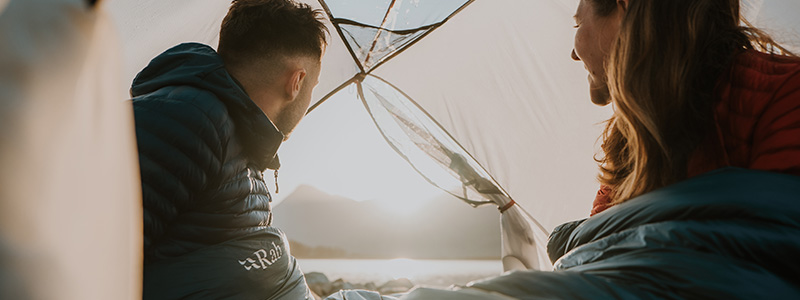
Almost all campsites have rules which vary from site to site. You’ll find these rules listed on the campsite websites or if it’s a phone booking the host should explain.
Aside from the campsite-specific rules, several bits of camping etiquette run true to all campsites.
-
Be aware of making a lot of noise at night and early in the morning. If you want to be able to make a lot of noise without offending others try locating a campsite that caters for this e.g family camping, party campsite etc.
-
Respect other people's space and where they have pitched their tent. If possible try to pitch your tent a reasonable distance away from others and don’t walk through the middle of someone's camp as a shortcut.
-
Parking instructions should be given to you by the campsite but if not form a consensus from how other cars are parked and try not to block the view of someone's pitch.
-
If dogs are allowed, keep them under control at all times and clean up any mess.
-
Fires and BBQ’s are always covered in campsite rules - make sure to respect them and maintain the fire safely
-
Clean up all rubbish at your pitch and tidy up any communal areas with the aim to ‘Leave No Trace’ - it makes it a nicer experience for everyone.
-
Wild camping has its own distinct set of rules which must be adhered to at all times. We have a wild camping guide which explains in detail the necessary guidelines for this type of camping.
About the Author:Pete Fletcher - Outdoor ExpertPete grew up hiking trails in the Lake District before being introduced to skiing. A few decades later and you're most likely to find him snowboarding, out camping or making a mean coffee. |

